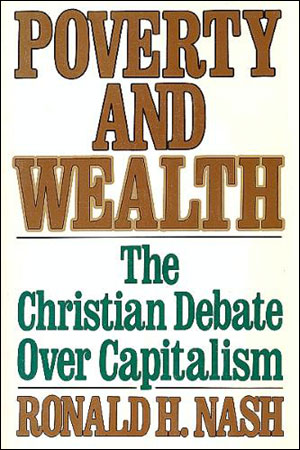This is an electronic copy of the entire article.
Review of the Book: Poverty and Wealth: The Christian
Debate Over Capitalism, by Ronald H. Nash.
This multifaceted book begins with the straightforward
assertion that Christians have an obligation both to help the
poor and to become informed as to the best means by which this
might be done. If the former is not complemented by the
latter, good intentions could be isolated from sound economic
theory, actually producing damaging results (p. 9).
At the end of the volume, author Ronald Nash summarizes the
twofold message of the book, providing his answer to the
opening assertion. Christians who wish to assist the poor need
capitalism and conversely, capitalism needs Christianity (p.
199). The first of these claims receives most of the attention
throughout the book.
In between these two statements is a detailed introduction to
economic theory. Nash disavows any attempt "to deduce a system
of economics from the Bible" (p. 12), since he finds that
Scripture contains no systematic teaching on economic theory
(p. 164). But this book is an effort toward countering
the numerous recent attempts to defend socialistic options (p.
12), which are said to be firmly entrenched on major
Evangelical campuses (p. 11).
In order to both explain and defend capitalism, chapters are
devoted to such topics as various basic economic principles,
the market, capitalism, socialism, Marxism, liberation
theology, interventionism, the Great Depression, Social
Security, the Christian use of wealth, and poverty in the
United States and abroad. End notes and a suggested reading
list provide additional data and resources for the interested
reader.
Several themes in the book deserve mentioning. After noting
three types of economic options--capitalism, socialism, and
the hybrid called interventionism (or the mixed economy)--Nash
may surprise some readers in his assertion that the U.S.
economy is interventionist, not capitalist (pp. 62-63).
One of the strongest elements is Nash's discussion of how
socialistic economic options require some sort of force (and
usually large amounts) to ensure compliance with its
principles (pp. 63-66). A related point is that practices such
as voluntary sharing of goods and simple living do not really
constitute socialism (p. 64).
Perhaps the most eye-opening discussion in the book is
entitled "Poverty in America" (chapter 16). Details are
provided regarding the extreme increase in assistance to the
American poor from 1965 to 1980 and the amazing claim that, in
spite of this marked increase, the percentage of poor stayed
the same, raising questions about U.S. welfare programs.
Lest the reader think that Nash is simply defending current
American economic policies, he should notice Nash's criticism
of the Social Security system (pp. 164-155), suggestions for
reform of the current welfare system (pp. 181-183), and
problems with interventionism (p. 62). In numerous other
places, Nash acknowledges a few additional extravagances of
the U.S. economy.
As Nash points out, most recent treatments of the
capitalism-socialism issues are concerned with more narrow
issues such as the Christian's use of money, especially with
regard to assisting the poor (p. 57). Nash's purpose is much
broader. Nonetheless, one might wish that his treatment of
this subject (chapter 15) was more in-depth, including a more
detailed look at numerous "hard" sayings such as Luke 12:33,
14:33; James 2:14-17; and 1 John 3:17, where Christians are
called to much more radical obedience than is often realized
in some treatments of the subject.
However, Nash agrees throughout with those who assert that it
is the Christian's duty to view all of his possessions as
given by the Lord to be used in stewardship and that believers
ought to share with those in need. Again, the importance of
this aspect of actual giving needs to be stressed.
At any rate, this book is a major effort to defend capitalism
by a noted Evangelical author and will have to be addressed by
those who choose socialistic options. His challenges and
citations of data deserve the attention of those who would
argue otherwise.
(Crossway Books, 1986, 223 pp., $8.95)
Gary Habermas
Citation Aid
Footnote Entry:
Gary R. Habermas, "Review: Poverty and
Wealth,"
Fundamentalist Journal, v6.
n4 (1987): [page range cited].
Bibliography Entry:
Habermas, Gary R. "Review: Poverty and Wealth."
Fundamentalist Journal, v6. n4 (1987): 58.
 by
Gary R. Habermas
by
Gary R. Habermas